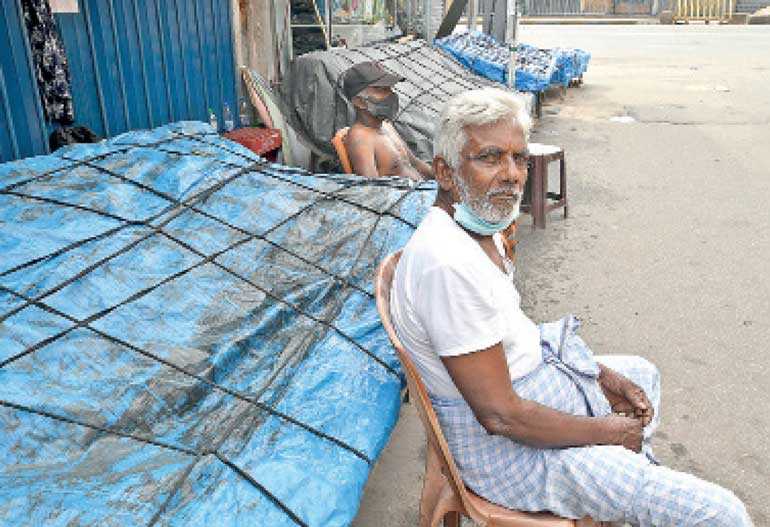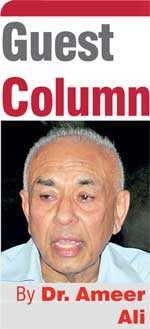Monday Feb 16, 2026
Monday Feb 16, 2026
Friday, 11 December 2020 00:00 - - {{hitsCtrl.values.hits}}

To a less discerning reader who just glances through the headlines and few opening sentences, that reporting would confirm what the Sinhala-Buddhist ultra-nationalists have been advocating provocatively since 2009, that Muslims in this country are taking over its economy. Their only evidence for this propaganda are the Muslim-owned retail shops scattered over the Sinhalese districts, the ubiquity of Muslim peddlers who vend miscellaneous items, and one or two successful Muslim-owned retain fashion chains in the cities – Pic by Shehan Gunasekara
Ethno-religious prejudice is running so deep in the veins of among sections of the media and journalists  that even an innocent report from the World Bank on ‘Informality, Job Quality, and Welfare,’ released on 2 December is read through an ethnic lens.
that even an innocent report from the World Bank on ‘Informality, Job Quality, and Welfare,’ released on 2 December is read through an ethnic lens.
Two days before that, a newspaper (not in the Wijeya Group) dragged the Catholic Archbishop of Colombo, Cardinal Malcolm Ranjith, into an unnecessary controversy about sharia and its role in the Easter Sunday massacre. The Cardinal had to refute the words and sentiments attributed to him by a journalist.
Similarly, the same paper carried another piece on the same day titled, ‘Non-Tamil Minorities earn more than Sinhalese – WB,’ and opened its report with the sentence, “Sri Lanka Moor-Muslims and other non-Tamil minorities earn more than Sinhalese workers.”
To a less discerning reader who just glances through the headlines and few opening sentences, that reporting would confirm what the Sinhala-Buddhist ultra-nationalists have been advocating provocatively since 2009, that Muslims in this country are taking over its economy.
Their only evidence for this propaganda are the Muslim-owned retail shops scattered over the Sinhalese districts, the ubiquity of Muslim peddlers who vend miscellaneous items, and one or two successful Muslim-owned retain fashion chains in the cities.
Would these propagandists dare to ask the relevant Government agencies to publish economic data relating to who owns what and how much do they earn? Would they also call for an ethnic breakdown of statistics relating to the extent of poverty in this country to see which community has the largest percentage of the poor? Be that as it may, what does the World Bank report say?
In a 58-page report on Sri Lanka’s informal sector and its impact on quality of life and welfare there is one sentence on p. 38, which says, “By ethnicity, Sri Lanka Moors and other non-Tamil minorities earn on average more than Sinhalese workers.”
If one cares to read the entire report one would realise that the above sentence refers to the informal sector. The way Ceylon Today reported it was not to educate the reader but to deliberately create  prejudice and sow hatred against the Muslim community.
prejudice and sow hatred against the Muslim community.
The report reveals an important economic truth about employment in Sri Lanka. According to its findings, informal jobs account for 70% of total jobs in the country, and “that there remains a wage premium associated with formal employment”.
Within this, “formal public sector employees enjoy a wage premium even after controlling for worker and firm characteristics”. In other words, the wage and privileges enjoyed by workers in the public sector, which is predominantly filled with Sinhalese and openly discriminatory against minorities are above that enjoyed by employees in the formal private sector and far, far above that in the informal sector workers.
Workers in this sector are at the bottom of the pile. If on “average,” Muslims are earning more than Sinhalese workers in the informal sector that is simply because of hard work and immense sacrifices – a fact that anti-Muslim provokers refuse to understand.
The fact of the matter is that because of prolonged negligence of scientific and technological education and poverty, the Muslim community in general is ill equipped to compete for employment in the formal sector. The public sector is discriminatory against minorities. Therefore the only option for many of them is to become self-employed as petty traders and tenant cultivators and enter the informal sector.
The working hours are long and income depends on sacrifices. If some are earning more than others it simply shows how productive they are. Shouldn’t this be praised and be welcomed rather than viewed with jealousy and hatred? Unfortunately, it is the latter that sections of the media are trying to promote.
It is a sad note on the history of public policy in Sri Lanka that its overriding objective had been to rob Peter to give Paul. When Sinhalese Governments found in 1950s that Tamils were dominating public sector employment, because of English education, the remedy undertaken was not to teach English to Sinhalese children and make them competitive but to remove English as medium of instruction and introduce Swabasha.
 In the 1970s, when they found that Tamil undergraduates were dominating the science, engineering and medical faculties in the universities, instead of improving science education in Sinhalese schools the standardisation scheme was brought in which enabled students with less score in science subjects enter those faculties. The end result was falling standard in higher education.
In the 1970s, when they found that Tamil undergraduates were dominating the science, engineering and medical faculties in the universities, instead of improving science education in Sinhalese schools the standardisation scheme was brought in which enabled students with less score in science subjects enter those faculties. The end result was falling standard in higher education.
A similar policy is now being advocated in relation to economic development also. If any community is found doing better than Sinhala-Buddhists that community should be punished and privileges be given to the lagging one. There is no denying the fact that Muslim farmers in the Eastern Province are among the most productive agriculturists in the country.
Instead of encouraging them by providing them with more land, better irrigation facilities, fertiliser and modern agricultural implements, Gotha’s Archaeology Task Force is bent on grabbing even the existing lands in the name of protecting ancient ruins.
The latest destruction of cattle sheds belonging to Muslim cattle breeders at Tampala in Polonnaruwa, on the pretext of clearing land claimed to belong to the Somadevi Rajamaha Vihare, is another instance of robbing Peter to give Paul. The Government is powerless to stop this economic damage, because Buddhist monks are backing the clearance.
As Gehan Gunatilleke wrote, there is a “symbiotic relationship between the Buddhist clergy and politicians” and that relationship is stronger under the Rajapaksa regime. With this sort of discriminatory policy however, how does GR expect to realise his ‘Vistas of Splendour and Prosperity’?
The clergy, sections of the media and a capitalist mafia are in collaboration with the ruling regime to recreate July 1983 with a different target. Because, that is the only way to divert increasing criticism against successive failures of this regime.
While all this is happening, it is a pathetic sight to see the elected Muslim members in the Parliament, including the Muslim minister in the Cabinet, sitting like dummies without saying anything about the economic havoc spreading in Muslim areas. Their silence is more dangerous than the voice of Muslim haters.
(The writer is attached to the School of Business & Governance, Murdoch University, Western Australia.)